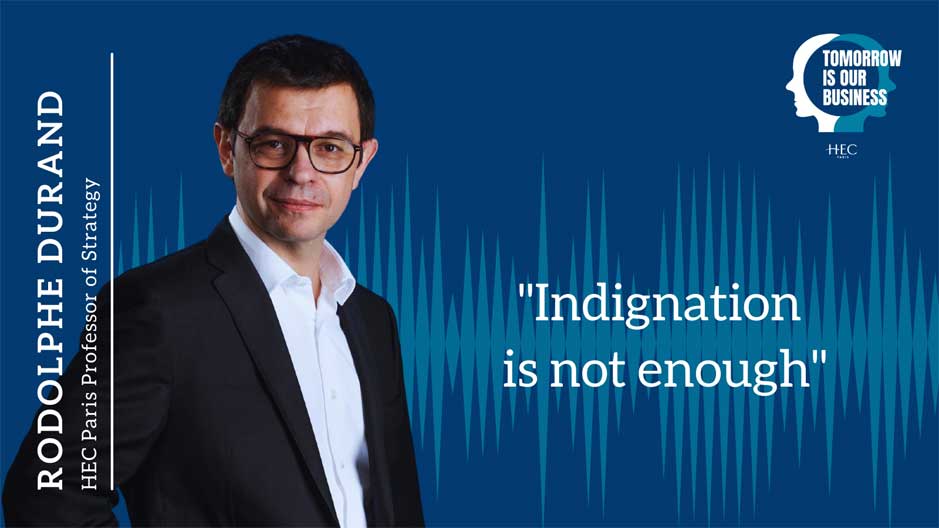[PODCAST] "I’m an orgologist": Rodolphe Durand in Tomorrow Is Our Business, Episode 1
“Our model of the world no longer seems to coincide with sustainable reality”. This observation is at the root of Rodolphe Durand’s commitment as an academic: enabling the quest for purpose and elaborating solutions to societal and business issues. In this first episode of Tomorrow Is Our Business podcast, Season 1 on Engagement, we met with Rodolphe Durand, HEC Paris Professor of Strategy & Business Policy, Founder and Academic Director of the Society and Organizations Institute and Holder of the Joly Family Purposeful Leadership Chair.
If you look up the word “orgologist” in your dictionary, you won’t (yet) find any definition! It was first introduced in a major book by Rodolphe Durand, entitled “Organizations, Strategy and Society. The Orgology of Disorganized Worlds” (published in 2015 by Routledge and previously in French in 2013 “La désorganisation du monde” by Editions Au bord de l’eau). In this book/Here, Rodolphe conceptualized a new management discipline that bridges the frontiers between sociology and economy: Orgology, the science of organizations. In this podcast he explains why existent categories were not relevant to analyse our changing world, why organizations are key actors of change and how they can renew the meaning that individuals give to their lives.
Beyond the theoretical contribution, Rodolphe talks about the societal impact that he is aiming for: enabling individuals and organizations to commit to remodelling the world. What is fascinating about Rodolphe is that he is both committed to have an impact on students, on academics, on firms, on business leaders as well as on citizens at large. What is unique about him is that is message is relevant for each of these categories.
I really came to the realization that I was part and pieces with some of the trends that leading us collectively as a species probably to a dire future.
In this podcast, Rodolphe confides in us about the genesis of his engagement, which followed the shock from the 2007 global financial crisis and his observation of a world that was “falling to shreds” from a loss of meaning. On a personal scale, he shares his subsequent awareness and his heightened sense of responsibility as an academic. On a more global scale, he describes the “end of an economic fiction”, the one of maximization of profit.
You will hear how his engagement translates in his teachings. For instance, through his course “Have A Cause, Make An Impact”, his former student Betina de Reachers (MSc Sustainability and Social Innovation), tells us about her experience and how his course has influenced her way of thinking as a social entrepreneur.
I would like to make students conscious about the responsabilities they have, to be where they are, and envision the future as actors of possible changes
You will hear why he considers that citizens’ indignation is not enough and why we need to reorganize our world, to rethink our attachments to organizations, to recreate meaning and become actors of change.
You will hear a capitalist advocating for a new type of capitalism, where firms are looking for purpose and social impact beyond profit and shareholder value.
You will hear what it means to have a purpose with Hubert Joly, the co-founder with Rodolphe Durand of the Joly Family Purposeful Leadership Chair.
You will hear an academic who is convinced that business schools are not part of the problem, but are, in fact, part of the solution. Because business schools are where we can make change happen.
Listen on your favorite platform:
Listen to the TRAILER of Tomorrow Is Our Business
